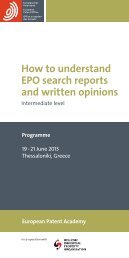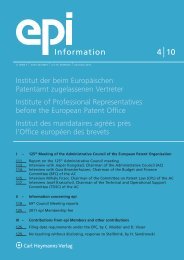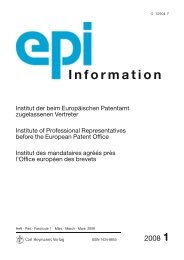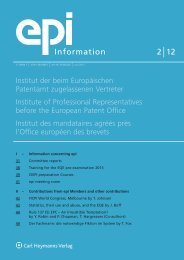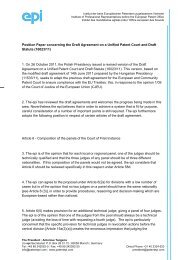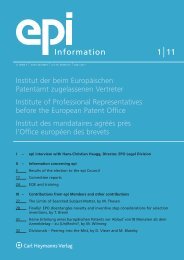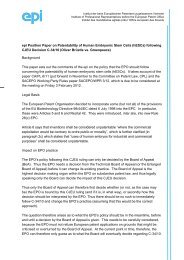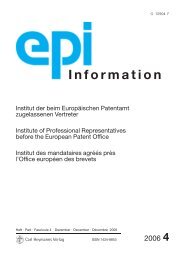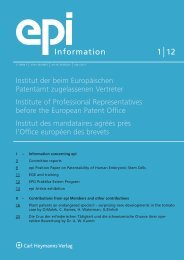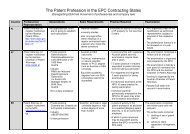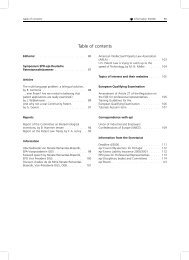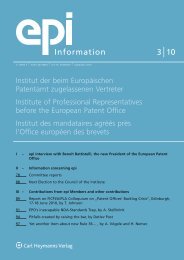epi Information 2/2009
epi Information 2/2009
epi Information 2/2009
Create successful ePaper yourself
Turn your PDF publications into a flip-book with our unique Google optimized e-Paper software.
<strong>Information</strong> 2/<strong>2009</strong> Articles 59<br />
the subsequent EP2 if EP1 is not withdrawn prior to<br />
publication.<br />
This decision applies especially in the chemistry/<br />
biotechnology field, where disclaimers are not only a<br />
legal opportunity to avoid undue limitations of the<br />
scope of the claims, but also a real means to define a<br />
valuable invention which may be lost without such a<br />
disclaimer.<br />
Belgium on the way to ratification<br />
of the London Agreement?<br />
G. Voortmans (BE), G. Narmon (BE)<br />
and M. Messely (BE)<br />
In an article that appeared in EPI <strong>Information</strong> 4/2008,<br />
titled „The London Agreement and the language situation<br />
in Belgium“, the author of that article, Mr. Gevers,<br />
has attempted to explain to the European patent profession<br />
why ratification of the London Agreement (LA)<br />
would form an impossible mix with the Belgian Linguistic<br />
situation. In the article, it is further stated that the LA is<br />
very difficult to accept by the Flemish, who form the<br />
majority of the Belgian population. According to Mr.<br />
Gevers, this would in particular be so because after<br />
ratification of the LA, since Belgium has French in common<br />
with the official languages of the EPO, no translation<br />
of the claims into Dutch could be asked for, hence<br />
leaving the majority population of Belgium without a<br />
translation of the claims into their mother tongue.<br />
Mr. Gevers opinion is not one that is shared by the<br />
majority in Belgium. Indeed, an overwhelming majority<br />
of the Belgian industry, including enterprises operating in<br />
the Flemish region already have expressed their support<br />
to ratification of the LA by Belgium. Already in 2006 have<br />
the Union of Belgian Enterprises (VBO), Flanders’<br />
Chamber of Commerce (VOKA), VOB/UEB (Brussels)<br />
and Union Wallonne des Entreprises Wallon (UWE)<br />
requested in a joint declaration that Belgium would ratify<br />
the LA. It is likewise supported by many patent professionals<br />
in private practice.<br />
Likewise are the Belgian Companies and their respective<br />
associations in favor a European Union Patent, as well<br />
as of a European Union Patent Court. The willingness of<br />
the Belgian industry to ratify the LA is a strong signal that<br />
Belgium does not wish or want to have a language issue<br />
get in the way of establishing a European Union Court<br />
and a European Union Patent.<br />
The ratification has also been positively advised on by<br />
„de Hoge Raad voor IE“, an advisory body to the Minister of<br />
Economic Affairs. Following this positive advice, the ratification<br />
law has been introduced in the Belgian Senate. It is<br />
therefore to be expected that Belgium will ratify the LA.<br />
There is also no reason why Belgium should not ratify<br />
the LA. Like in any other Member State of the EPC,<br />
ratification generally means a reduction in cost of validation<br />
of the European Patent in the relevant Member<br />
State, hence making the European Patent more affordable.<br />
The situation in Belgium is no more or less complicated<br />
than in other Member States. The fact that the<br />
Flemish community would be left without translation of<br />
the claims in Dutch is one that has existed for many years<br />
prior to the entry into force of the LA and is one that will<br />
continue to exist until Belgium ratifies the LA. Indeed,<br />
validation in Belgium is typically done by the filing of a<br />
translation of the European Patent into French. It is unlikely<br />
that anything will change in this respect if Belgium would<br />
not ratify the LA. If a patentee would wish to validate in<br />
Belgium, he could still do so, and likely would, file a French<br />
translation rather than a Dutch, particularly now that the<br />
Netherlands no longer require a Dutch translation.<br />
Further, as Mr. Gevers acknowledges, many patents<br />
ratified in Belgium would also be ratified in the Netherlands.<br />
The Netherlands have ratified the LA and require a<br />
Dutch translation of the claims. Hence, those that need or<br />
want to read a Dutch translation of the claims, could<br />
simply consult the Dutch validation of the European Patent.<br />
Why then insist on a Dutch translation of the claims<br />
for what allegedly would be a minority of cases where<br />
there would not be an equivalent in the Netherlands?<br />
Where then is this opposition in Belgium to the ratification<br />
of the LA coming from? The answer can perhaps<br />
be found in an article of Bruno Van Pottelsberghe 1 .In<br />
this article, it is stated that the LA provides a cost<br />
reduction of about 3 600 Euros per patent validated in<br />
5 countries. This amounts to an overall translation business<br />
of 220 million Euros or 8 million Euros for the<br />
Belgian translation business, which in Belgium is divided<br />
up between only few firms. It is understandable that this<br />
leads to some resistance against the ratification of the<br />
LA, but it should not weigh up against the genuine<br />
interest of the applicants to a more affordable European<br />
Patent System. It is therefore hoped that the strong<br />
support existing in Belgium for ratification of the LA<br />
precipitate in a ratification law soon rather than late.<br />
1 Les traductions de brevets européens : une résistance vénale et myope,<br />
Bruno Van Pottelsberghe, L’Echo, January <strong>2009</strong>



